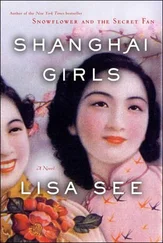Lisa See - Peony in Love
Здесь есть возможность читать онлайн «Lisa See - Peony in Love» весь текст электронной книги совершенно бесплатно (целиком полную версию без сокращений). В некоторых случаях можно слушать аудио, скачать через торрент в формате fb2 и присутствует краткое содержание. Жанр: Старинная литература, на английском языке. Описание произведения, (предисловие) а так же отзывы посетителей доступны на портале библиотеки ЛибКат.
- Название:Peony in Love
- Автор:
- Жанр:
- Год:неизвестен
- ISBN:нет данных
- Рейтинг книги:4 / 5. Голосов: 1
-
Избранное:Добавить в избранное
- Отзывы:
-
Ваша оценка:
- 80
- 1
- 2
- 3
- 4
- 5
Peony in Love: краткое содержание, описание и аннотация
Предлагаем к чтению аннотацию, описание, краткое содержание или предисловие (зависит от того, что написал сам автор книги «Peony in Love»). Если вы не нашли необходимую информацию о книге — напишите в комментариях, мы постараемся отыскать её.
Peony in Love — читать онлайн бесплатно полную книгу (весь текст) целиком
Ниже представлен текст книги, разбитый по страницам. Система сохранения места последней прочитанной страницы, позволяет с удобством читать онлайн бесплатно книгу «Peony in Love», без необходимости каждый раз заново искать на чём Вы остановились. Поставьте закладку, и сможете в любой момент перейти на страницу, на которой закончили чтение.
Интервал:
Закладка:
They looked at me in disbelief.
“All girls have dreams,” Yu Niang repeated.
“But Ren was real.” I pointed over the balustrade to the earthly realm below. “Look there. That’s him.”
A dozen girls—not one over the age of sixteen—looked over the edge and followed my finger to Ren’s home, where they saw him writing in his library.
“That’s a young man, but how do we know he’s the one you met?”
“How do we know you met him at all?”
In the afterworld, we are sometimes able to be transported back through the years to relive our experiences or see them through another’s eyes. This is one reason that the hells are so terrible. People are given the opportunity to relive their misdeeds forever. But now I relived very different kinds of memories so the lovesick maidens could see them. I carried the girls back to the Riding-the-Wind Pavilion, the Moon-Viewing Pavilion, and to my final visit as a spirit to Ren. They cried at the beauty and truth of my story, and below us a storm fell on Hangzhou.
“Only in death did Liniang prove her undying passion,” I said, as the girls wiped their eyes. “You’ll see. One day Ren and I will be married.”
“How is that going to happen?” the actress asked.
“How can the moon be scooped from the water’s surface, or flowers be plucked from the void?” I asked in return, quoting Mengmei. “The scholar didn’t know how he was going to bring Liniang back from the dead, but he did it. Ren will figure it out too.”
The girls were lovely and sweet, but they didn’t believe me.
“You may have met and talked to this man, but your lovesickness was just like ours,” Yu Niang said. “We all starved ourselves to death.”
“All you can hope is that your parents will publish your poems,” the salt merchant’s daughter offered helpfully. “In this way you may live again a little. That’s what happened to me.”
“And me too.”
The others chimed in that their families had also published their poetry.
“Most of our families don’t make offerings to us,” the merchant’s ( 1 2 0 )
daughter confided, “but we receive some sustenance because our poems are in print. We don’t know why this happens, but it does.”
This was hardly good news. I’d hidden my poems in my father’s library and Ren’s mother now had Volume One hidden in one of her drawers.
The girls shook their heads disconsolately when I told them this.
“Perhaps you should talk to Xiaoqing about these matters,” Yu Niang suggested. “She has more experience than we do. Maybe she can help you.”
“I would love to meet her,” I said eagerly. “I would appreciate her advice even more. Please bring her the next time you come.”
But they didn’t bring her. And the great Tang Xianzu didn’t come to visit either, although the lovesick maidens said the author was nearby.
So mostly I was alone.
i n l i f e, i ’d been told many things about the afterworld; some were right, some were wrong. Most people call it the underworld, but I prefer to call it the afterworld, because it isn’t really under, although some parts are. Beyond the actual geography of the place, where I was seemed to be after —simply a continuation. Death doesn’t terminate our associations to our families, and the positions we held in life don’t change either. If you were a peasant in the earthly realm, you continued your work in the fields here; if you were once a landowner, a scholar, or a member of the literati, you spent your days reading, writing poetry, drinking tea, and burning incense. Women still had bound feet, were obedient, and focused their attention on their families; men still oversaw the outer realm by navigating through the infernal judges’ bureaus upon bureaus of darkness.
I continued to learn what I could and couldn’t do. I could float, drift, melt. Without Shao or Willow to help me, I learned to care for my feet with the spirit bindings my family had burned for my use in the afterworld. I could hear from a great distance, but I hated noise. I couldn’t turn sharp corners. And when I looked over the balustrade, I could see a lot, but I was unable to look beyond Hangzhou’s environs.
After I’d been on the Viewing Terrace for many months, an old woman came to visit. She introduced herself as my grandmother, but she didn’t look at all like the stern-faced woman in the ancestor portrait that hung in our ancestral hall.
“ Waaa! Why do they make ancestors look like that?” she cackled. “I never looked so disapproving in life.”
( 1 2 1 )
Grandmother was still handsome. Her hair was pinned with ornaments made of gold, pearls, and jade. Her gown was of the lightest silk.
Her lily feet were smaller even than my own. Her face was etched with fine lines but her skin was luminous. Her hands were covered in long water sleeves in the old style. She seemed delicate and ladylike, but when she sat down next to me and pressed against my thigh I felt surprising strength.
Over the next few weeks, she came to visit often but she never brought Grandfather and always evaded questions about him.
“He’s busy in another place,” she might say. Or, “He’s helping your father with a negotiation in the capital. People at court are devious and your father is out of practice.” Or, “He’s probably visiting one of his concubines . . . in her dreams. He likes to do that sometimes, because in their dreams the concubines are still young and beautiful, not the old hens they’ve become.”
I liked listening to her wicked comments about the concubines, because in life I’d always heard that she’d been kind and generous toward them. She’d been an exemplar of what a head wife should be, but here she liked to tease and banter.
“Stop looking at that man down there!” she snapped at me one day, several months after her first visit.
“How do you know who I’m looking at?”
She jabbed me with her elbow. “I’m an ancestor! I saw it all ! Think about that, child.”
“But he’s my husband,” I offered lamely.
“You were never married,” she retorted. “You can be happy for that!”
“Happy? Ren and I were fated to be together.”
My grandmother snorted. “The idea is ridiculous. You weren’t fated to be together. You simply had a marriage arranged by your father, like every other girl. There’s nothing special in that. And in case you’ve forgotten, you’re here.”
“I’m not worried,” I said. “Baba’s going to arrange a ghost marriage for me.”
“You should consider more carefully what you see below.”
“You’re testing me. I understand—”
“No, your father has other plans.”
“I can’t see Baba when he’s in the capital, but what does it matter anyway? Even if he doesn’t arrange a ghost marriage, I’ll wait for Ren. That’s why I’m stuck here, don’t you think?”
( 1 2 2 )
She ignored my question.
“Do you think this man will wait for you ?” Her face crinkled as though she had opened a jar of stinky tofu. She was my grandmother—a cherished ancestor!—so I couldn’t contradict her. “Don’t worry so much about him,” she said, patting my face through the water sleeve that covered her hand. “You were a good granddaughter. I appreciated the fruit you brought me all those years.”
“Then why didn’t you help me?”
“I had nothing against you.”
It was a strange comment, but often she said things I didn’t understand.
“Now pay attention,” Grandmother ordered. “You need to think about why you’re stuck here.”
al l th rou g h th i s time, important dates came and went. My parents forgot to include me in their New Year’s offerings, which were just days after my death. On the thirteenth day of the first month after the New Year, they were supposed to place a lighted lamp at my tomb. At Spring Festival, they should have cleaned my grave, exploded firecrackers, and burned spirit money for me to use in the afterworld. On the first day of the tenth month, the official start of winter, they should have burned padded jackets, woolen caps, and fur-lined boots all made of paper to keep me warm. Throughout the year, my family should have been making offerings to me of cooked rice, wine, plates of meat, and spirit money on the first and fifteenth of every moon. All these offerings had to be presented to my dotted ancestor tablet for me to receive them in the afterworld. But when Shao didn’t bring it out of its hiding place and no one asked for it, I concluded that everyone was still too upset by my absence to look at my ancestor tablet.
Читать дальшеИнтервал:
Закладка:
Похожие книги на «Peony in Love»
Представляем Вашему вниманию похожие книги на «Peony in Love» списком для выбора. Мы отобрали схожую по названию и смыслу литературу в надежде предоставить читателям больше вариантов отыскать новые, интересные, ещё непрочитанные произведения.
Обсуждение, отзывы о книге «Peony in Love» и просто собственные мнения читателей. Оставьте ваши комментарии, напишите, что Вы думаете о произведении, его смысле или главных героях. Укажите что конкретно понравилось, а что нет, и почему Вы так считаете.












